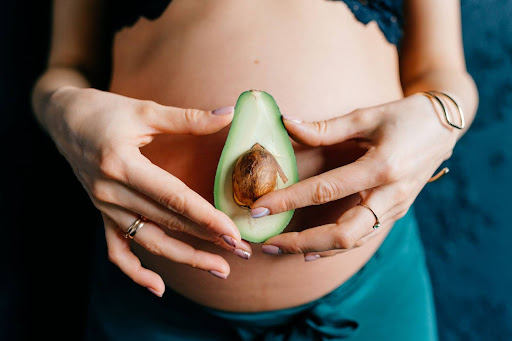 Kernodle Clinic - A DukeMedicine PRACTICE
Kernodle Clinic - A DukeMedicine PRACTICE
- Burlington 336-538-1234
- Mebane 919-563-2500
- Elon Family 336-538-2314
- Elon Pediatrics 336-538-2416
Debunking 9 Popular Pregnancy Nutrition Myths

Pregnancy, one of life’s greatest adventures, is not free from misconceptions. The abundance of information available can lead to confusion, and myths surrounding pregnancy nutrition often circulate. It’s essential to separate fact from fiction to ensure that expectant mothers make informed choices for a healthy pregnancy. At Kernodle OB/GYN, we’re here to debunk some common pregnancy nutrition myths.
Myth 1: “Eating for Two” Means Doubling Food Intake:
One of the most prevalent pregnancy nutrition myths is the notion that pregnant women should eat twice as much as usual. In reality, the concept of “eating for two” does not mean doubling portion sizes. During the first trimester, there is no need for additional calories. In the second and third trimesters, an additional ~300 calories per day are recommended, depending on individual factors and activity levels.
Myth 2: “Avoid All Seafood During Pregnancy”:
While it is true that certain types of fish high in mercury should be limited during pregnancy, avoiding all seafood is a misconception. Fish such as salmon, trout, and shrimp are rich in omega-3 fatty acids, which are crucial for the baby’s brain and eye development. The FDA recommends pregnancy nutrition should include 2 to 3 servings of lower-mercury fish per week. It is, however, recommended that pregnant women stay away from undercooked and raw fish, often found in sushi.
Myth 3: “Caffeine Should Be Completely Eliminated”:
While excessive caffeine intake can be harmful during pregnancy, moderate consumption is generally considered safe. The American College of Obstetricians and Gynecologists advises limiting caffeine intake to 200 milligrams per day, equivalent to about one 12-ounce cup of coffee. It’s important to be mindful of caffeine content in other sources, such as tea and chocolate.
Myth 4: “You Must Avoid All Sweets And Desserts”:
Pregnancy does not mean complete deprivation of sweets and desserts. While it’s essential to prioritize nutrient-dense foods, occasional indulgence in moderation is acceptable. Cravings are common during pregnancy, and satisfying them in a balanced way can help maintain overall dietary enjoyment.
Myth 5: “All Herbal Teas Are Safe”:
Many herbal teas are marketed as pregnancy-friendly, but not all are safe when it comes to pregnancy nutrition. Some herbs can have adverse effects on pregnancy. It’s crucial to consult with a healthcare provider before consuming herbal teas, as certain herbs may stimulate uterine contractions or pose other risks. Teas that should be avoided include but are not limited to fennel, sage, vervain, borage, pennyroyal, licorice, and thyme.
Myth 6: “Vegetarian Diets Are Inadequate For Pregnancy”:
A well-planned vegetarian or vegan diet can provide all the necessary nutrients for a healthy pregnancy. Plant-based diets can offer ample protein, iron, calcium, and other essential nutrients. However, it’s crucial to pay attention to sources of key nutrients, such as protein, vitamin B12, iron, and omega-3 fatty acids, and consider supplements if needed.
Myth 7: “Spicy Foods Cause Preterm Labor”:
There is no scientific evidence to support the idea that spicy foods induce preterm labor. While some pregnant women may experience heartburn or discomfort from spicy foods, they are generally safe to consume in moderation. Individual tolerance may vary, so it’s essential to pay attention to how certain foods affect one’s digestive system.
Myth 8: “Prenatal Vitamins Replace A Healthy Diet”:
Prenatal vitamins are a valuable supplement, but they should not be seen as a substitute for a balanced and nutritious diet. Whole foods provide a wide range of essential nutrients that contribute to the overall health of both mother and baby. Prenatal vitamins are meant to complement, not replace, a healthy eating plan.
Myth 9: “Gaining More Weight Equals A Healthier Baby”:
The idea that a larger baby is a healthier baby is a misconception. Excessive weight gain during pregnancy can lead to complications for both the mother and the baby. It’s important to follow healthcare provider recommendations for weight gain based on individual factors and to focus on the quality of nutrition rather than excessive calorie intake.
Navigating pregnancy nutrition can be challenging amid the abundance of information and myths. It’s essential for expectant mothers to consult with their healthcare providers to receive personalized guidance based on their health, lifestyle, and individual needs. Here at Kernodle OB/GYN, we provide full-scope individualized women’s health care, including gynecological care, midwifery services, and low- and high-risk maternity care for women and their families. If you have more questions about pregnancy nutrition, call Kernodle OB/GYN at (336) 538-2367 to make an appointment.
